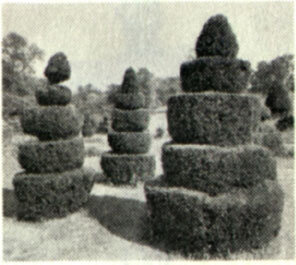Topiary currently lectures in the Film & Digital Media Department at UC Santa Cruz and in the MFA Film program at California College of Arts. She has also taught at the School for Visual Arts, CUNY’s College of Staten Island, the Pratt Institute and the Media Studies graduate program at New School University in New York City.
Still from Zama, dir. Lucretia Martel, Argentina, 2017
CURRENT CLASSES
THE EDITOR AS AUTHOR
A history of film editing using the lens of the auteur theory. Questioning the concept of film authorship so central to the “auteur theory,” this class will focus on the significant and too often under-recognized contributions of film editors in both fiction and documentary filmmaking. As much as possible, we will read what film editors themselves have written about their craft and have said in their own words in interviews. Through closely analyzing their work, we will come to understand the development and evolution of the craft of film editing, paying close attention to major aesthetic developments. In exploring the development of the craft, we will look at how individual editors cross genres and disciplinary boundaries to push the art of filmmaking in new directions. Comparing and contrasting different films edited by specific editors, we will learn to identify the extraordinary and central contributions that film editors make, both to the films they edit, and to the reputations of the directors with which they collaborate.
CITY SYMPHONY AND THE URBAN LANDSCAPE ESSAY FILM GENRE
A theory-practice seminar exploring the historical and the contemporary iterations of the under theorized genre of urban landscape essay film. Beginning with the classical city symphony—we will survey some of the main developments of this early genre of amateur and artist silent filmmaking. Analyzing important aspects of this genre including cross-sectional montage, the use of synecdochic subject matter, and many eclectic uses of voice, music and sound in contemporary works. We will consider the importance and relevance of this form of filmmaking, framed in the context of the many political and social dimensions offered by urban landscape essay filmmaking. In particular, we will use this subject to inspire our own creative projects as well as to sharpen our tools of critical perception and expression.
THE HISTORY OF NEW MEDIA
An overview of the the history of “new media” beginning with the invention of electricity and early forms of coding and transmission and broadly covering topics including cybernetics, networks, interactivity, resolution, social media, algorithmic technologies, AI, privacy and surveillance and speculative post-humanism. Analyzing the relationship between technology and social change, this course emphasizes issues of social justice including race, gender, sexuality, physical ability and immigration status in relationship this topic. Readings, screenings and lectures engage with works of media history, media theory and critical writing, experimental films, documentaries and new media art. The course highlights arguments and concerns that particular types of media raise in society, and some of our work includes exploring the expressive capabilities that new media forms provide to us.
ECOCINEMA AS GENRE
Lecture course exploring a range of developments in the “genre” (albeit an unruly one) of eco-cinema. Students are guided through a set of themes and theoretical approaches to the representation of nature, human and non-human experiences of ecosystem, the environment, and topics related to the politics of environmentalism and anthropogenic climate change. Juxtaposing a wide range of films that span across film history, geography, and film form including narrative film, documentary, animation, non-theatrical and experimental art film, we unpack representational issues entangled with ecological ones. As a genre course, this class wrestles with assumptions about genre and considers how eco-cinema transcends traditional generic categories much in the ways that environmental topics transcends so many boundary conditions. Drawing on eco-philosophical and eco-critical approaches, we will focus on understanding how visual media affects us and how we might better use media to affect the world.
INTERNATIONAL CINEMA, 1960 - PRESENT
A survey of international cinema since 1960, emphasizing non-English speaking countries, post-colonial politics and national and transnational film movements.
FILM, VIDEO, GENDER
A class that explores the many ways that representations of gender impacts story, society, culture and assumptions about spectatorship. Looking at some of the ways that gender, body and sexuality intersects with many other aspects of identity, culture, art, belief, religion, economics, history, politics and nationality. Works studied include both narrative fiction and documentary.
DIGITAL MEDIA WORKSHOP IN INTERACTIVE DOCUMENTARY
A production course focusing on interactive, web-connected, database-driven, new media documentary forms. Students use smartphone cameras and microphones, their own writing and drawing, as well as archival materials and found footage, to prototype their own created interactive documentary project experimenting with three different kinds of interactive tools: Twine, StoryMaps and Klynt. This class involves experimenting with different models of interactivity. Success in the class emphasizes willingness to learn, experiment, and explore a variety of different platforms and methods that integrate text, graphic design, info-graphics, maps, photographs, sound files and moving images.

